Foundation Year: Challenges and Study Skills in Higher Education
VerifiedAdded on 2021/02/20
|10
|2728
|249
Report
AI Summary
This report analyzes the significance of foundation years in the UK higher education system, emphasizing their role in bridging academic gaps and preparing students for university. It identifies key challenges faced by foundation year students, including time management, unfamiliar teaching methods, workload, and social issues like bullying and financial constraints. The report then explores the study skills that aid students in overcoming these challenges, such as cognitive learning, effective time management, and strategies for dealing with bullying and financial difficulties. It highlights the importance of peer support, self-directed learning, and improved communication skills in fostering academic success and personal growth. The report underscores the role of the foundation year in widening participation in higher education and providing support to students from diverse backgrounds.
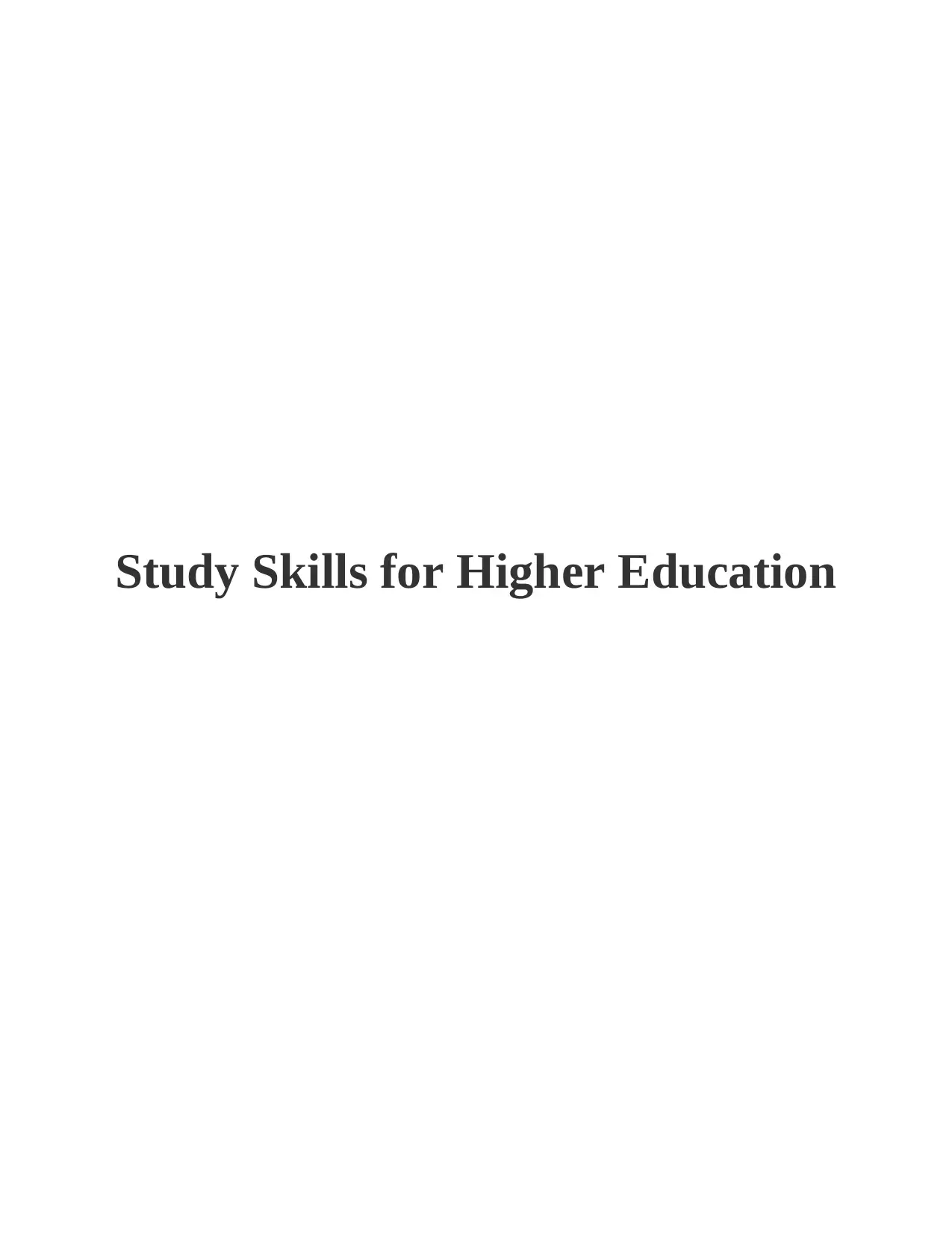
Study Skills for Higher Education
Paraphrase This Document
Need a fresh take? Get an instant paraphrase of this document with our AI Paraphraser
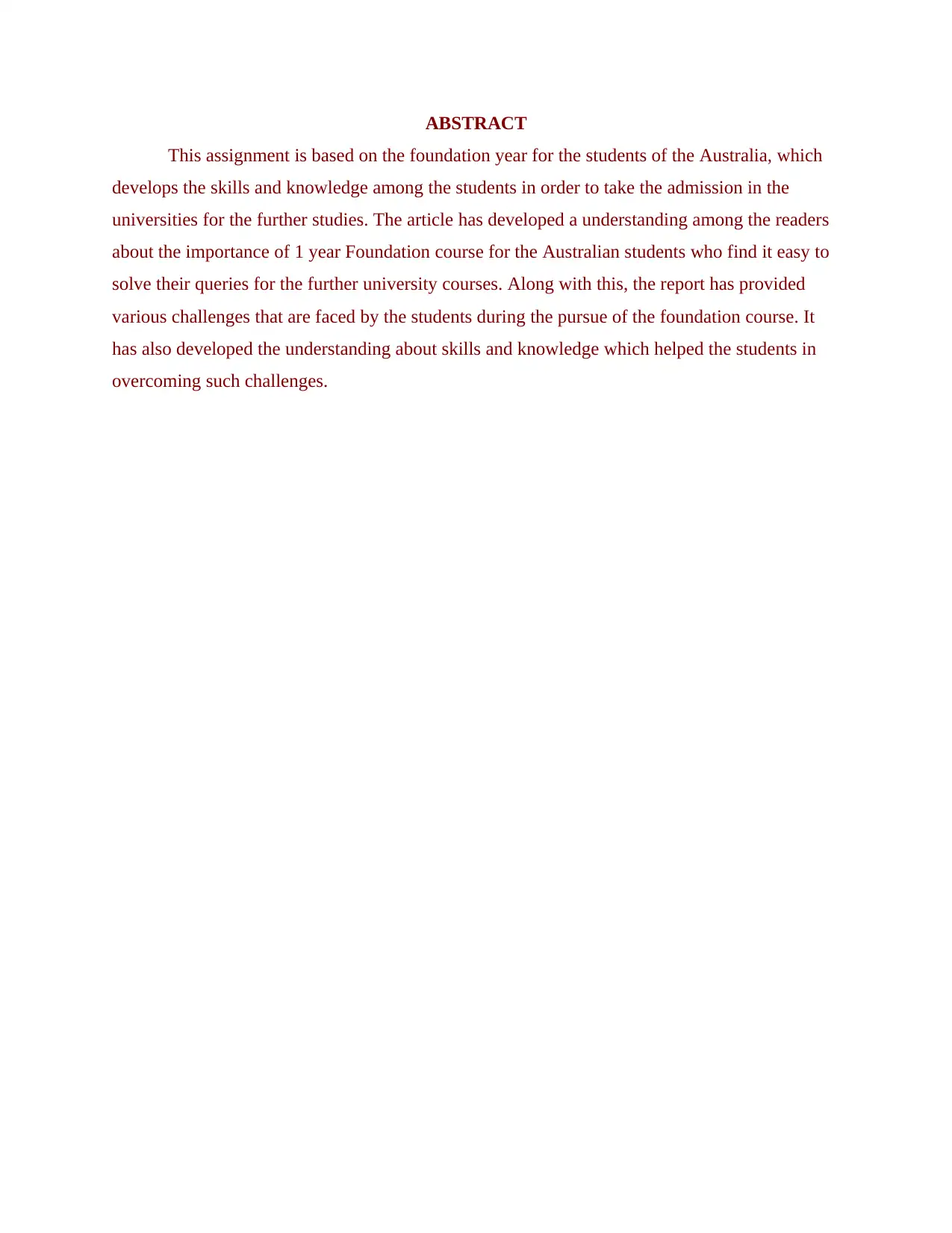
ABSTRACT
This assignment is based on the foundation year for the students of the Australia, which
develops the skills and knowledge among the students in order to take the admission in the
universities for the further studies. The article has developed a understanding among the readers
about the importance of 1 year Foundation course for the Australian students who find it easy to
solve their queries for the further university courses. Along with this, the report has provided
various challenges that are faced by the students during the pursue of the foundation course. It
has also developed the understanding about skills and knowledge which helped the students in
overcoming such challenges.
This assignment is based on the foundation year for the students of the Australia, which
develops the skills and knowledge among the students in order to take the admission in the
universities for the further studies. The article has developed a understanding among the readers
about the importance of 1 year Foundation course for the Australian students who find it easy to
solve their queries for the further university courses. Along with this, the report has provided
various challenges that are faced by the students during the pursue of the foundation course. It
has also developed the understanding about skills and knowledge which helped the students in
overcoming such challenges.
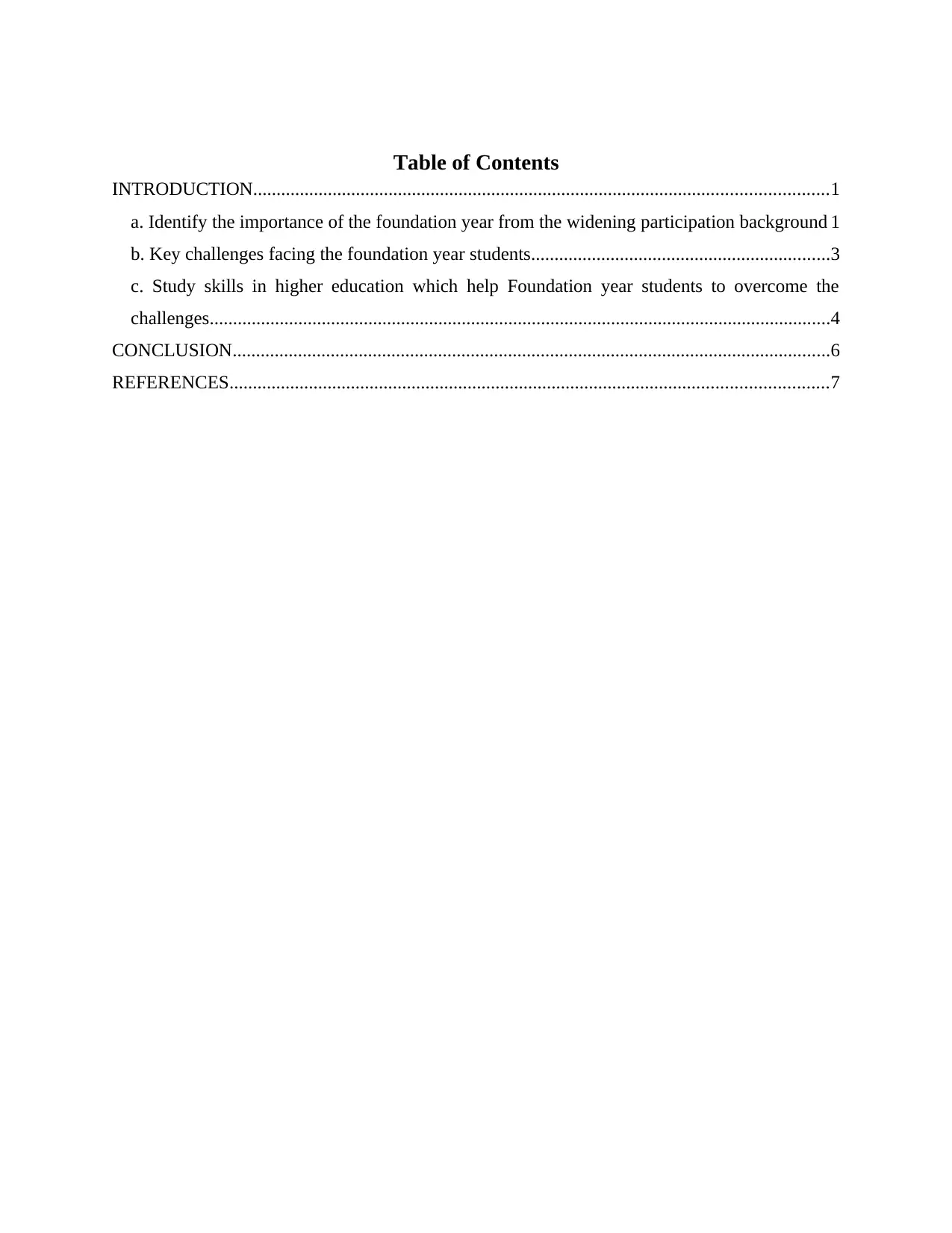
Table of Contents
INTRODUCTION...........................................................................................................................1
a. Identify the importance of the foundation year from the widening participation background 1
b. Key challenges facing the foundation year students................................................................3
c. Study skills in higher education which help Foundation year students to overcome the
challenges.....................................................................................................................................4
CONCLUSION................................................................................................................................6
REFERENCES................................................................................................................................7
INTRODUCTION...........................................................................................................................1
a. Identify the importance of the foundation year from the widening participation background 1
b. Key challenges facing the foundation year students................................................................3
c. Study skills in higher education which help Foundation year students to overcome the
challenges.....................................................................................................................................4
CONCLUSION................................................................................................................................6
REFERENCES................................................................................................................................7
⊘ This is a preview!⊘
Do you want full access?
Subscribe today to unlock all pages.

Trusted by 1+ million students worldwide
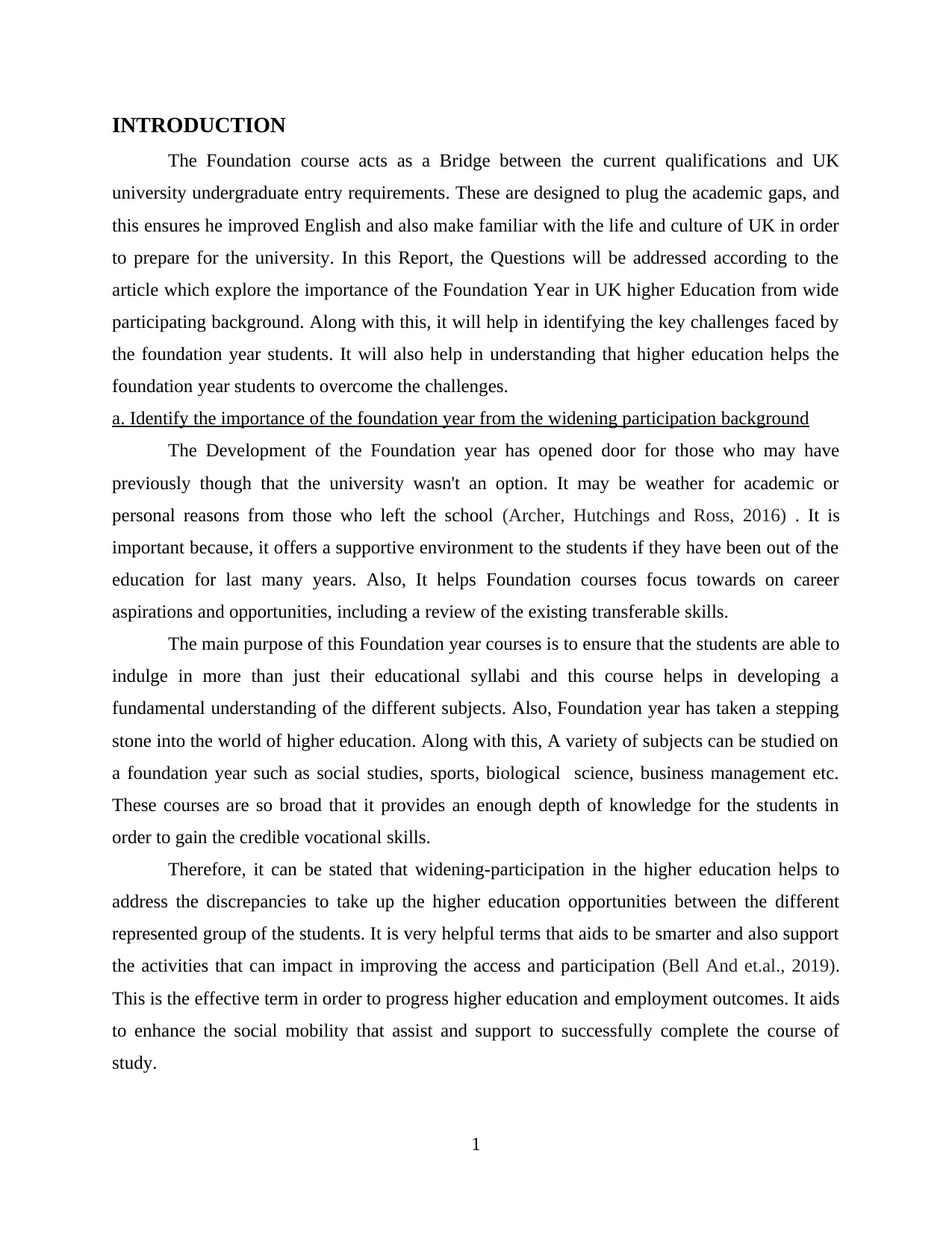
INTRODUCTION
The Foundation course acts as a Bridge between the current qualifications and UK
university undergraduate entry requirements. These are designed to plug the academic gaps, and
this ensures he improved English and also make familiar with the life and culture of UK in order
to prepare for the university. In this Report, the Questions will be addressed according to the
article which explore the importance of the Foundation Year in UK higher Education from wide
participating background. Along with this, it will help in identifying the key challenges faced by
the foundation year students. It will also help in understanding that higher education helps the
foundation year students to overcome the challenges.
a. Identify the importance of the foundation year from the widening participation background
The Development of the Foundation year has opened door for those who may have
previously though that the university wasn't an option. It may be weather for academic or
personal reasons from those who left the school (Archer, Hutchings and Ross, 2016) . It is
important because, it offers a supportive environment to the students if they have been out of the
education for last many years. Also, It helps Foundation courses focus towards on career
aspirations and opportunities, including a review of the existing transferable skills.
The main purpose of this Foundation year courses is to ensure that the students are able to
indulge in more than just their educational syllabi and this course helps in developing a
fundamental understanding of the different subjects. Also, Foundation year has taken a stepping
stone into the world of higher education. Along with this, A variety of subjects can be studied on
a foundation year such as social studies, sports, biological science, business management etc.
These courses are so broad that it provides an enough depth of knowledge for the students in
order to gain the credible vocational skills.
Therefore, it can be stated that widening-participation in the higher education helps to
address the discrepancies to take up the higher education opportunities between the different
represented group of the students. It is very helpful terms that aids to be smarter and also support
the activities that can impact in improving the access and participation (Bell And et.al., 2019).
This is the effective term in order to progress higher education and employment outcomes. It aids
to enhance the social mobility that assist and support to successfully complete the course of
study.
1
The Foundation course acts as a Bridge between the current qualifications and UK
university undergraduate entry requirements. These are designed to plug the academic gaps, and
this ensures he improved English and also make familiar with the life and culture of UK in order
to prepare for the university. In this Report, the Questions will be addressed according to the
article which explore the importance of the Foundation Year in UK higher Education from wide
participating background. Along with this, it will help in identifying the key challenges faced by
the foundation year students. It will also help in understanding that higher education helps the
foundation year students to overcome the challenges.
a. Identify the importance of the foundation year from the widening participation background
The Development of the Foundation year has opened door for those who may have
previously though that the university wasn't an option. It may be weather for academic or
personal reasons from those who left the school (Archer, Hutchings and Ross, 2016) . It is
important because, it offers a supportive environment to the students if they have been out of the
education for last many years. Also, It helps Foundation courses focus towards on career
aspirations and opportunities, including a review of the existing transferable skills.
The main purpose of this Foundation year courses is to ensure that the students are able to
indulge in more than just their educational syllabi and this course helps in developing a
fundamental understanding of the different subjects. Also, Foundation year has taken a stepping
stone into the world of higher education. Along with this, A variety of subjects can be studied on
a foundation year such as social studies, sports, biological science, business management etc.
These courses are so broad that it provides an enough depth of knowledge for the students in
order to gain the credible vocational skills.
Therefore, it can be stated that widening-participation in the higher education helps to
address the discrepancies to take up the higher education opportunities between the different
represented group of the students. It is very helpful terms that aids to be smarter and also support
the activities that can impact in improving the access and participation (Bell And et.al., 2019).
This is the effective term in order to progress higher education and employment outcomes. It aids
to enhance the social mobility that assist and support to successfully complete the course of
study.
1
Paraphrase This Document
Need a fresh take? Get an instant paraphrase of this document with our AI Paraphraser
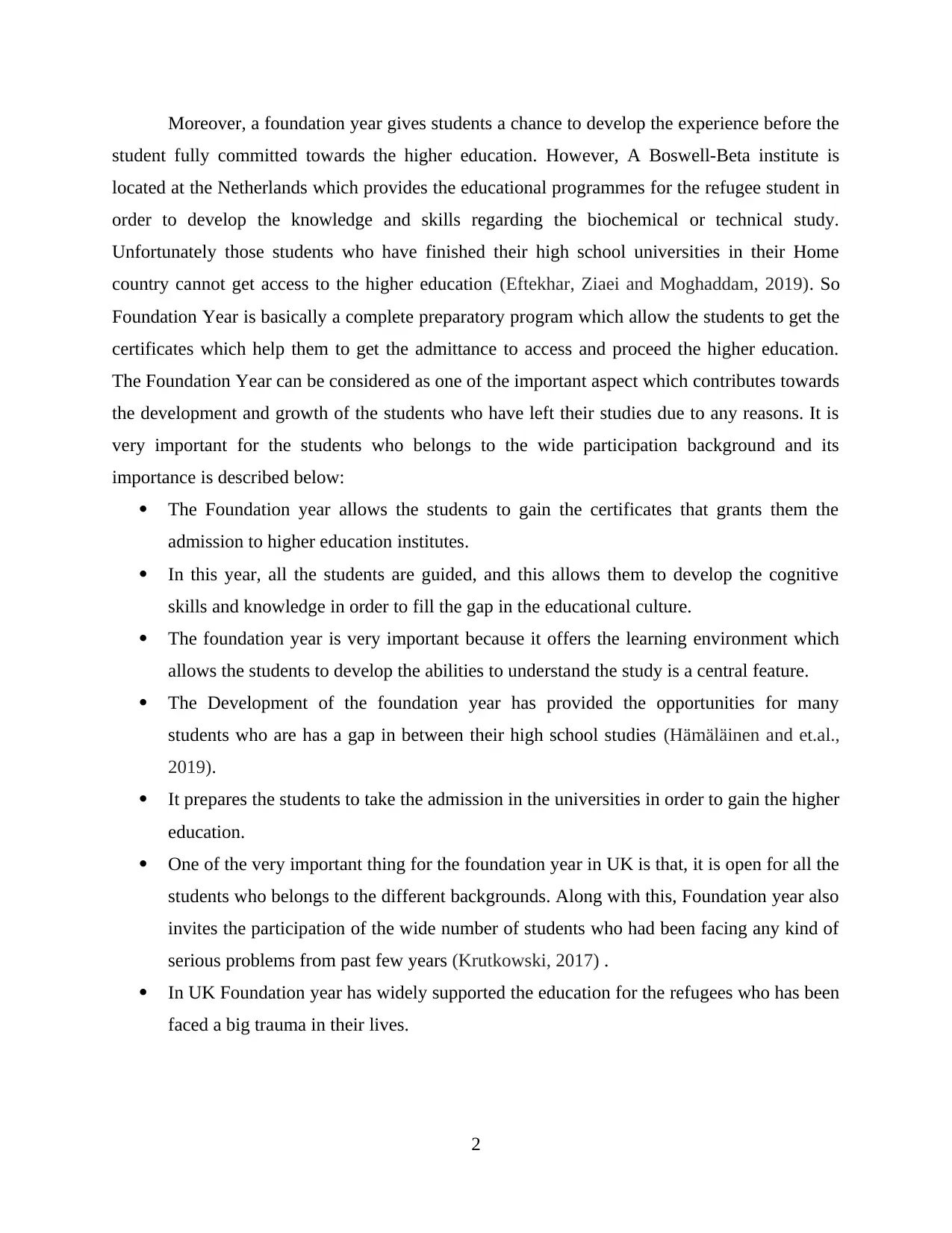
Moreover, a foundation year gives students a chance to develop the experience before the
student fully committed towards the higher education. However, A Boswell-Beta institute is
located at the Netherlands which provides the educational programmes for the refugee student in
order to develop the knowledge and skills regarding the biochemical or technical study.
Unfortunately those students who have finished their high school universities in their Home
country cannot get access to the higher education (Eftekhar, Ziaei and Moghaddam, 2019). So
Foundation Year is basically a complete preparatory program which allow the students to get the
certificates which help them to get the admittance to access and proceed the higher education.
The Foundation Year can be considered as one of the important aspect which contributes towards
the development and growth of the students who have left their studies due to any reasons. It is
very important for the students who belongs to the wide participation background and its
importance is described below:
The Foundation year allows the students to gain the certificates that grants them the
admission to higher education institutes.
In this year, all the students are guided, and this allows them to develop the cognitive
skills and knowledge in order to fill the gap in the educational culture.
The foundation year is very important because it offers the learning environment which
allows the students to develop the abilities to understand the study is a central feature.
The Development of the foundation year has provided the opportunities for many
students who are has a gap in between their high school studies (Hämäläinen and et.al.,
2019).
It prepares the students to take the admission in the universities in order to gain the higher
education.
One of the very important thing for the foundation year in UK is that, it is open for all the
students who belongs to the different backgrounds. Along with this, Foundation year also
invites the participation of the wide number of students who had been facing any kind of
serious problems from past few years (Krutkowski, 2017) .
In UK Foundation year has widely supported the education for the refugees who has been
faced a big trauma in their lives.
2
student fully committed towards the higher education. However, A Boswell-Beta institute is
located at the Netherlands which provides the educational programmes for the refugee student in
order to develop the knowledge and skills regarding the biochemical or technical study.
Unfortunately those students who have finished their high school universities in their Home
country cannot get access to the higher education (Eftekhar, Ziaei and Moghaddam, 2019). So
Foundation Year is basically a complete preparatory program which allow the students to get the
certificates which help them to get the admittance to access and proceed the higher education.
The Foundation Year can be considered as one of the important aspect which contributes towards
the development and growth of the students who have left their studies due to any reasons. It is
very important for the students who belongs to the wide participation background and its
importance is described below:
The Foundation year allows the students to gain the certificates that grants them the
admission to higher education institutes.
In this year, all the students are guided, and this allows them to develop the cognitive
skills and knowledge in order to fill the gap in the educational culture.
The foundation year is very important because it offers the learning environment which
allows the students to develop the abilities to understand the study is a central feature.
The Development of the foundation year has provided the opportunities for many
students who are has a gap in between their high school studies (Hämäläinen and et.al.,
2019).
It prepares the students to take the admission in the universities in order to gain the higher
education.
One of the very important thing for the foundation year in UK is that, it is open for all the
students who belongs to the different backgrounds. Along with this, Foundation year also
invites the participation of the wide number of students who had been facing any kind of
serious problems from past few years (Krutkowski, 2017) .
In UK Foundation year has widely supported the education for the refugees who has been
faced a big trauma in their lives.
2
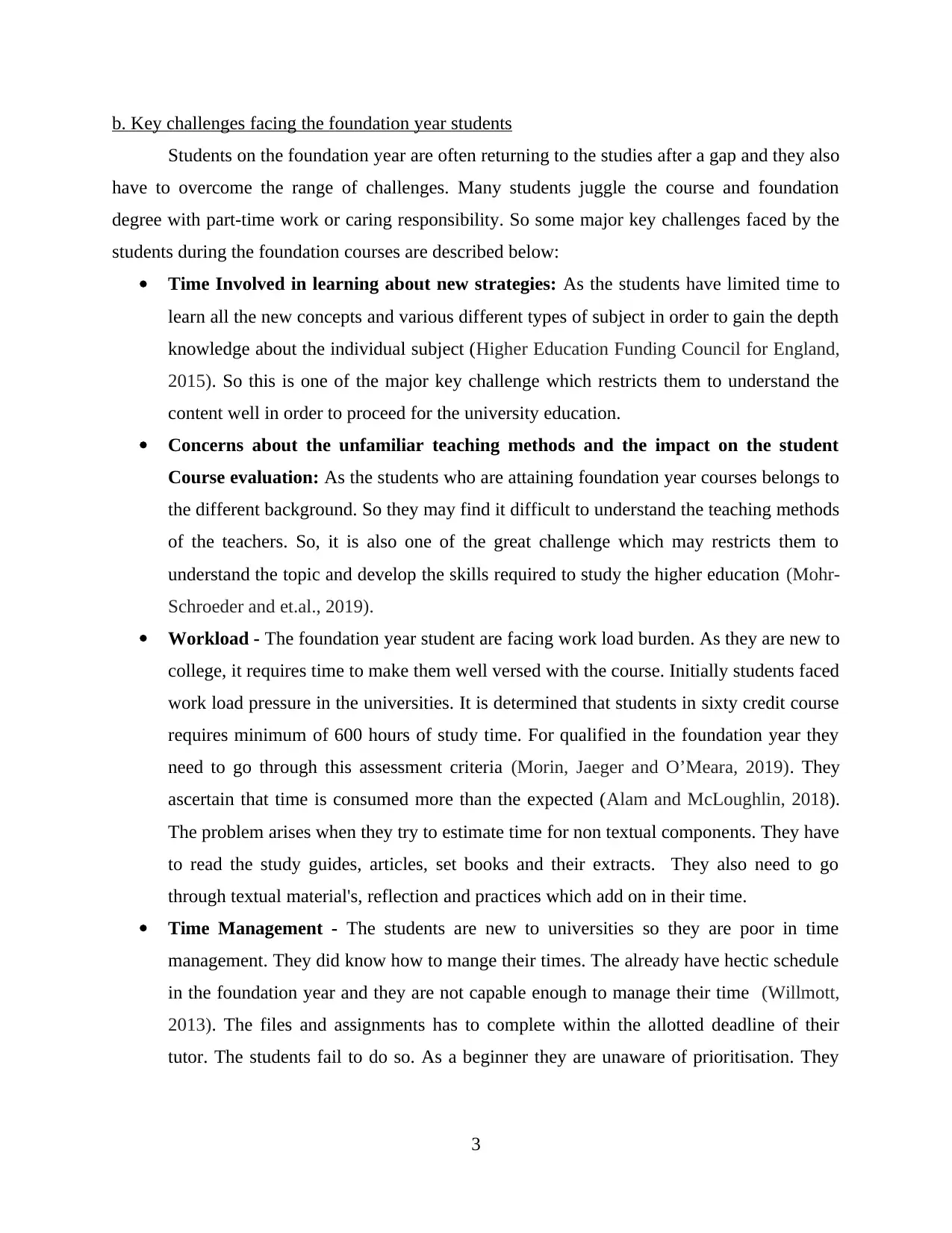
b. Key challenges facing the foundation year students
Students on the foundation year are often returning to the studies after a gap and they also
have to overcome the range of challenges. Many students juggle the course and foundation
degree with part-time work or caring responsibility. So some major key challenges faced by the
students during the foundation courses are described below:
Time Involved in learning about new strategies: As the students have limited time to
learn all the new concepts and various different types of subject in order to gain the depth
knowledge about the individual subject (Higher Education Funding Council for England,
2015). So this is one of the major key challenge which restricts them to understand the
content well in order to proceed for the university education.
Concerns about the unfamiliar teaching methods and the impact on the student
Course evaluation: As the students who are attaining foundation year courses belongs to
the different background. So they may find it difficult to understand the teaching methods
of the teachers. So, it is also one of the great challenge which may restricts them to
understand the topic and develop the skills required to study the higher education (Mohr-
Schroeder and et.al., 2019).
Workload - The foundation year student are facing work load burden. As they are new to
college, it requires time to make them well versed with the course. Initially students faced
work load pressure in the universities. It is determined that students in sixty credit course
requires minimum of 600 hours of study time. For qualified in the foundation year they
need to go through this assessment criteria (Morin, Jaeger and O’Meara, 2019). They
ascertain that time is consumed more than the expected (Alam and McLoughlin, 2018).
The problem arises when they try to estimate time for non textual components. They have
to read the study guides, articles, set books and their extracts. They also need to go
through textual material's, reflection and practices which add on in their time.
Time Management - The students are new to universities so they are poor in time
management. They did know how to mange their times. The already have hectic schedule
in the foundation year and they are not capable enough to manage their time (Willmott,
2013). The files and assignments has to complete within the allotted deadline of their
tutor. The students fail to do so. As a beginner they are unaware of prioritisation. They
3
Students on the foundation year are often returning to the studies after a gap and they also
have to overcome the range of challenges. Many students juggle the course and foundation
degree with part-time work or caring responsibility. So some major key challenges faced by the
students during the foundation courses are described below:
Time Involved in learning about new strategies: As the students have limited time to
learn all the new concepts and various different types of subject in order to gain the depth
knowledge about the individual subject (Higher Education Funding Council for England,
2015). So this is one of the major key challenge which restricts them to understand the
content well in order to proceed for the university education.
Concerns about the unfamiliar teaching methods and the impact on the student
Course evaluation: As the students who are attaining foundation year courses belongs to
the different background. So they may find it difficult to understand the teaching methods
of the teachers. So, it is also one of the great challenge which may restricts them to
understand the topic and develop the skills required to study the higher education (Mohr-
Schroeder and et.al., 2019).
Workload - The foundation year student are facing work load burden. As they are new to
college, it requires time to make them well versed with the course. Initially students faced
work load pressure in the universities. It is determined that students in sixty credit course
requires minimum of 600 hours of study time. For qualified in the foundation year they
need to go through this assessment criteria (Morin, Jaeger and O’Meara, 2019). They
ascertain that time is consumed more than the expected (Alam and McLoughlin, 2018).
The problem arises when they try to estimate time for non textual components. They have
to read the study guides, articles, set books and their extracts. They also need to go
through textual material's, reflection and practices which add on in their time.
Time Management - The students are new to universities so they are poor in time
management. They did know how to mange their times. The already have hectic schedule
in the foundation year and they are not capable enough to manage their time (Willmott,
2013). The files and assignments has to complete within the allotted deadline of their
tutor. The students fail to do so. As a beginner they are unaware of prioritisation. They
3
⊘ This is a preview!⊘
Do you want full access?
Subscribe today to unlock all pages.

Trusted by 1+ million students worldwide
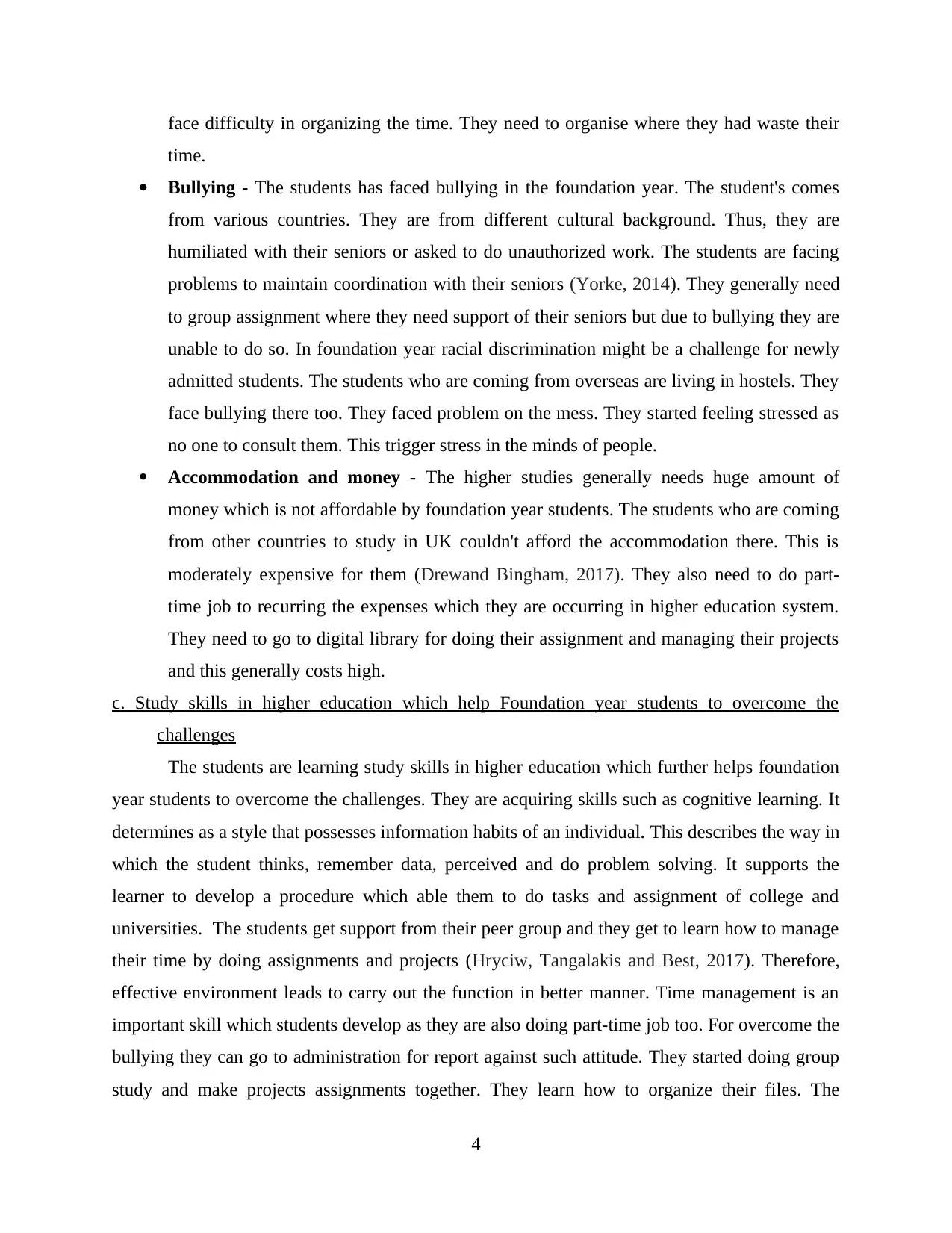
face difficulty in organizing the time. They need to organise where they had waste their
time.
Bullying - The students has faced bullying in the foundation year. The student's comes
from various countries. They are from different cultural background. Thus, they are
humiliated with their seniors or asked to do unauthorized work. The students are facing
problems to maintain coordination with their seniors (Yorke, 2014). They generally need
to group assignment where they need support of their seniors but due to bullying they are
unable to do so. In foundation year racial discrimination might be a challenge for newly
admitted students. The students who are coming from overseas are living in hostels. They
face bullying there too. They faced problem on the mess. They started feeling stressed as
no one to consult them. This trigger stress in the minds of people.
Accommodation and money - The higher studies generally needs huge amount of
money which is not affordable by foundation year students. The students who are coming
from other countries to study in UK couldn't afford the accommodation there. This is
moderately expensive for them (Drewand Bingham, 2017). They also need to do part-
time job to recurring the expenses which they are occurring in higher education system.
They need to go to digital library for doing their assignment and managing their projects
and this generally costs high.
c. Study skills in higher education which help Foundation year students to overcome the
challenges
The students are learning study skills in higher education which further helps foundation
year students to overcome the challenges. They are acquiring skills such as cognitive learning. It
determines as a style that possesses information habits of an individual. This describes the way in
which the student thinks, remember data, perceived and do problem solving. It supports the
learner to develop a procedure which able them to do tasks and assignment of college and
universities. The students get support from their peer group and they get to learn how to manage
their time by doing assignments and projects (Hryciw, Tangalakis and Best, 2017). Therefore,
effective environment leads to carry out the function in better manner. Time management is an
important skill which students develop as they are also doing part-time job too. For overcome the
bullying they can go to administration for report against such attitude. They started doing group
study and make projects assignments together. They learn how to organize their files. The
4
time.
Bullying - The students has faced bullying in the foundation year. The student's comes
from various countries. They are from different cultural background. Thus, they are
humiliated with their seniors or asked to do unauthorized work. The students are facing
problems to maintain coordination with their seniors (Yorke, 2014). They generally need
to group assignment where they need support of their seniors but due to bullying they are
unable to do so. In foundation year racial discrimination might be a challenge for newly
admitted students. The students who are coming from overseas are living in hostels. They
face bullying there too. They faced problem on the mess. They started feeling stressed as
no one to consult them. This trigger stress in the minds of people.
Accommodation and money - The higher studies generally needs huge amount of
money which is not affordable by foundation year students. The students who are coming
from other countries to study in UK couldn't afford the accommodation there. This is
moderately expensive for them (Drewand Bingham, 2017). They also need to do part-
time job to recurring the expenses which they are occurring in higher education system.
They need to go to digital library for doing their assignment and managing their projects
and this generally costs high.
c. Study skills in higher education which help Foundation year students to overcome the
challenges
The students are learning study skills in higher education which further helps foundation
year students to overcome the challenges. They are acquiring skills such as cognitive learning. It
determines as a style that possesses information habits of an individual. This describes the way in
which the student thinks, remember data, perceived and do problem solving. It supports the
learner to develop a procedure which able them to do tasks and assignment of college and
universities. The students get support from their peer group and they get to learn how to manage
their time by doing assignments and projects (Hryciw, Tangalakis and Best, 2017). Therefore,
effective environment leads to carry out the function in better manner. Time management is an
important skill which students develop as they are also doing part-time job too. For overcome the
bullying they can go to administration for report against such attitude. They started doing group
study and make projects assignments together. They learn how to organize their files. The
4
Paraphrase This Document
Need a fresh take? Get an instant paraphrase of this document with our AI Paraphraser
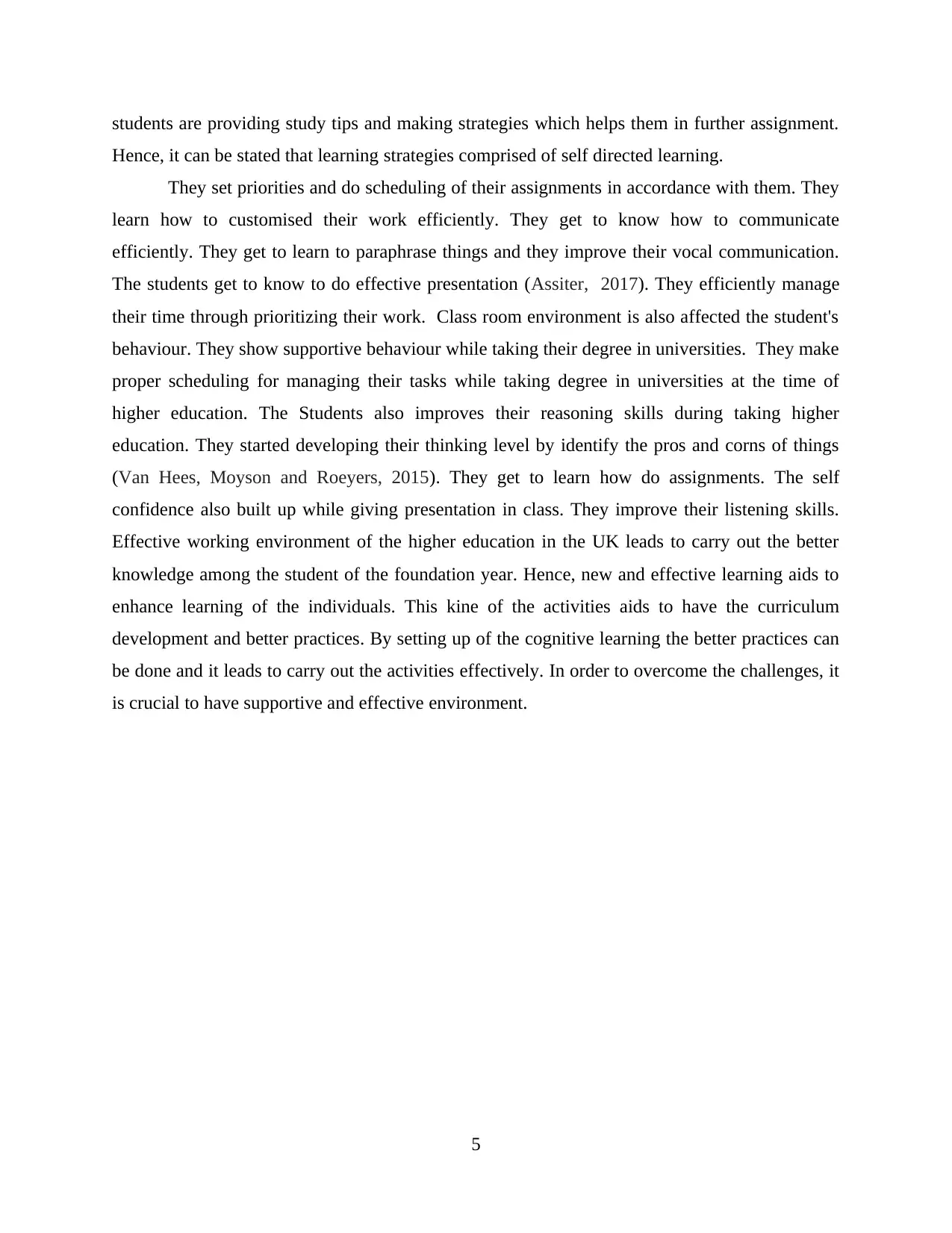
students are providing study tips and making strategies which helps them in further assignment.
Hence, it can be stated that learning strategies comprised of self directed learning.
They set priorities and do scheduling of their assignments in accordance with them. They
learn how to customised their work efficiently. They get to know how to communicate
efficiently. They get to learn to paraphrase things and they improve their vocal communication.
The students get to know to do effective presentation (Assiter, 2017). They efficiently manage
their time through prioritizing their work. Class room environment is also affected the student's
behaviour. They show supportive behaviour while taking their degree in universities. They make
proper scheduling for managing their tasks while taking degree in universities at the time of
higher education. The Students also improves their reasoning skills during taking higher
education. They started developing their thinking level by identify the pros and corns of things
(Van Hees, Moyson and Roeyers, 2015). They get to learn how do assignments. The self
confidence also built up while giving presentation in class. They improve their listening skills.
Effective working environment of the higher education in the UK leads to carry out the better
knowledge among the student of the foundation year. Hence, new and effective learning aids to
enhance learning of the individuals. This kine of the activities aids to have the curriculum
development and better practices. By setting up of the cognitive learning the better practices can
be done and it leads to carry out the activities effectively. In order to overcome the challenges, it
is crucial to have supportive and effective environment.
5
Hence, it can be stated that learning strategies comprised of self directed learning.
They set priorities and do scheduling of their assignments in accordance with them. They
learn how to customised their work efficiently. They get to know how to communicate
efficiently. They get to learn to paraphrase things and they improve their vocal communication.
The students get to know to do effective presentation (Assiter, 2017). They efficiently manage
their time through prioritizing their work. Class room environment is also affected the student's
behaviour. They show supportive behaviour while taking their degree in universities. They make
proper scheduling for managing their tasks while taking degree in universities at the time of
higher education. The Students also improves their reasoning skills during taking higher
education. They started developing their thinking level by identify the pros and corns of things
(Van Hees, Moyson and Roeyers, 2015). They get to learn how do assignments. The self
confidence also built up while giving presentation in class. They improve their listening skills.
Effective working environment of the higher education in the UK leads to carry out the better
knowledge among the student of the foundation year. Hence, new and effective learning aids to
enhance learning of the individuals. This kine of the activities aids to have the curriculum
development and better practices. By setting up of the cognitive learning the better practices can
be done and it leads to carry out the activities effectively. In order to overcome the challenges, it
is crucial to have supportive and effective environment.
5
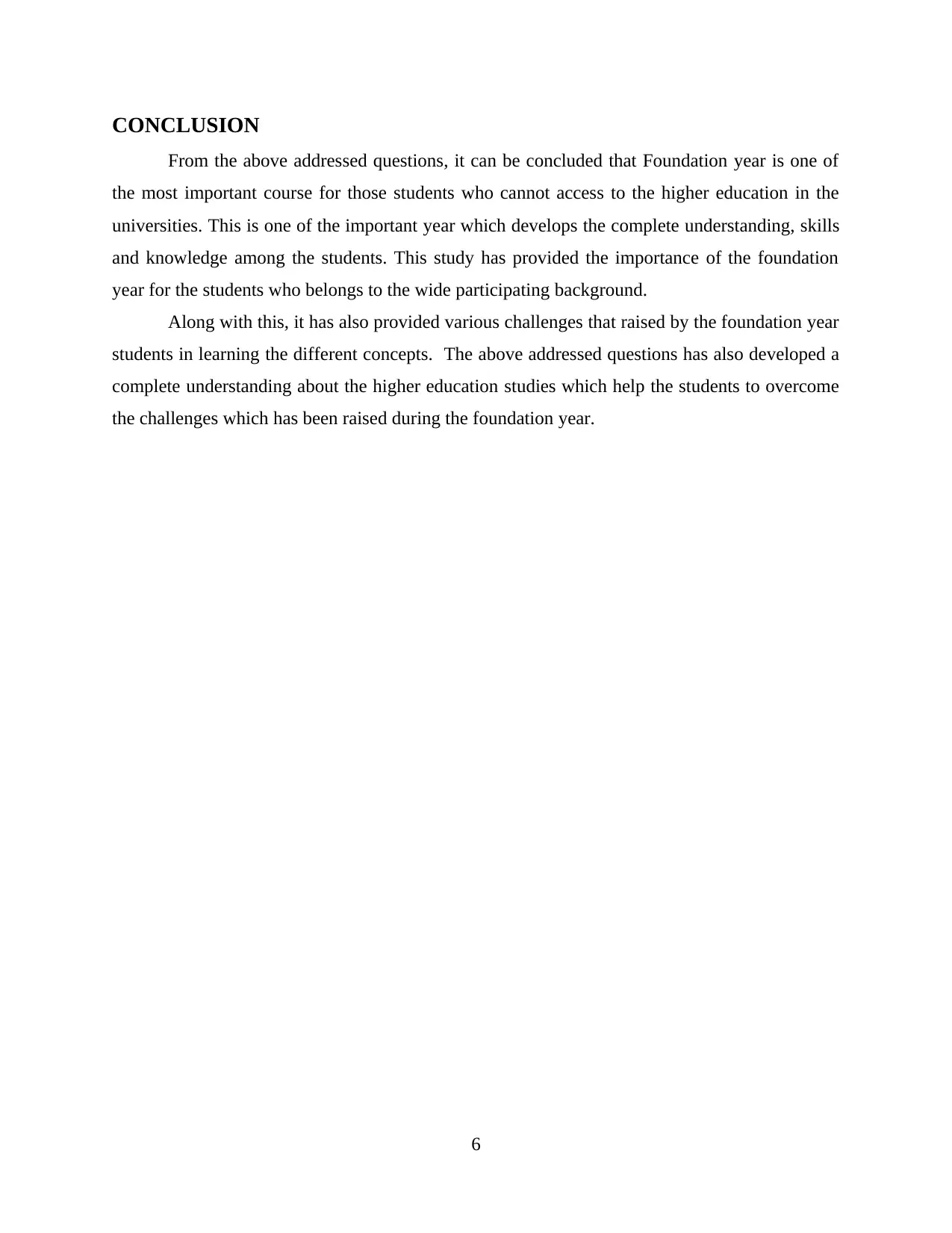
CONCLUSION
From the above addressed questions, it can be concluded that Foundation year is one of
the most important course for those students who cannot access to the higher education in the
universities. This is one of the important year which develops the complete understanding, skills
and knowledge among the students. This study has provided the importance of the foundation
year for the students who belongs to the wide participating background.
Along with this, it has also provided various challenges that raised by the foundation year
students in learning the different concepts. The above addressed questions has also developed a
complete understanding about the higher education studies which help the students to overcome
the challenges which has been raised during the foundation year.
6
From the above addressed questions, it can be concluded that Foundation year is one of
the most important course for those students who cannot access to the higher education in the
universities. This is one of the important year which develops the complete understanding, skills
and knowledge among the students. This study has provided the importance of the foundation
year for the students who belongs to the wide participating background.
Along with this, it has also provided various challenges that raised by the foundation year
students in learning the different concepts. The above addressed questions has also developed a
complete understanding about the higher education studies which help the students to overcome
the challenges which has been raised during the foundation year.
6
⊘ This is a preview!⊘
Do you want full access?
Subscribe today to unlock all pages.

Trusted by 1+ million students worldwide
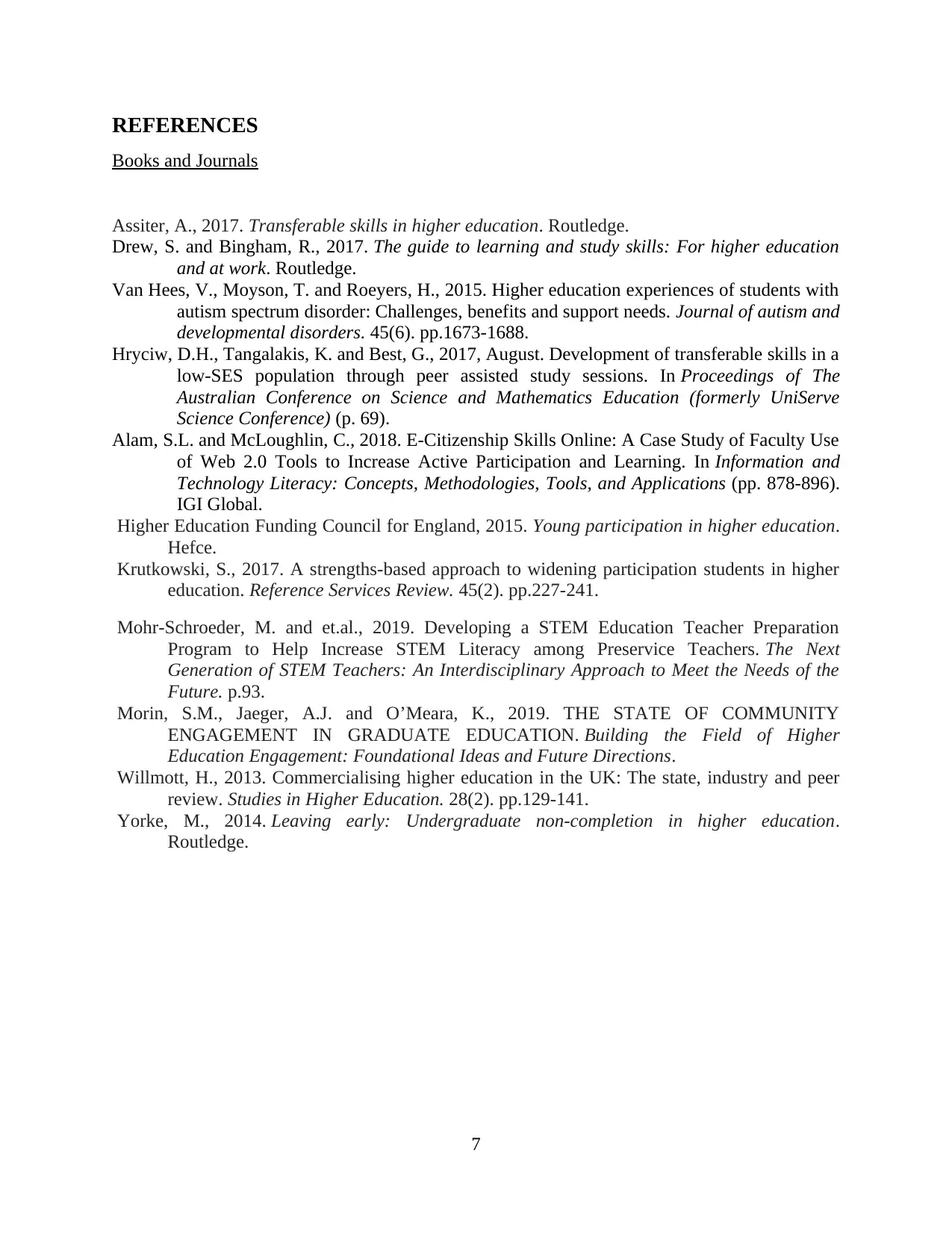
REFERENCES
Books and Journals
Assiter, A., 2017. Transferable skills in higher education. Routledge.
Drew, S. and Bingham, R., 2017. The guide to learning and study skills: For higher education
and at work. Routledge.
Van Hees, V., Moyson, T. and Roeyers, H., 2015. Higher education experiences of students with
autism spectrum disorder: Challenges, benefits and support needs. Journal of autism and
developmental disorders. 45(6). pp.1673-1688.
Hryciw, D.H., Tangalakis, K. and Best, G., 2017, August. Development of transferable skills in a
low-SES population through peer assisted study sessions. In Proceedings of The
Australian Conference on Science and Mathematics Education (formerly UniServe
Science Conference) (p. 69).
Alam, S.L. and McLoughlin, C., 2018. E-Citizenship Skills Online: A Case Study of Faculty Use
of Web 2.0 Tools to Increase Active Participation and Learning. In Information and
Technology Literacy: Concepts, Methodologies, Tools, and Applications (pp. 878-896).
IGI Global.
Higher Education Funding Council for England, 2015. Young participation in higher education.
Hefce.
Krutkowski, S., 2017. A strengths-based approach to widening participation students in higher
education. Reference Services Review. 45(2). pp.227-241.
Mohr-Schroeder, M. and et.al., 2019. Developing a STEM Education Teacher Preparation
Program to Help Increase STEM Literacy among Preservice Teachers. The Next
Generation of STEM Teachers: An Interdisciplinary Approach to Meet the Needs of the
Future. p.93.
Morin, S.M., Jaeger, A.J. and O’Meara, K., 2019. THE STATE OF COMMUNITY
ENGAGEMENT IN GRADUATE EDUCATION. Building the Field of Higher
Education Engagement: Foundational Ideas and Future Directions.
Willmott, H., 2013. Commercialising higher education in the UK: The state, industry and peer
review. Studies in Higher Education. 28(2). pp.129-141.
Yorke, M., 2014. Leaving early: Undergraduate non-completion in higher education.
Routledge.
7
Books and Journals
Assiter, A., 2017. Transferable skills in higher education. Routledge.
Drew, S. and Bingham, R., 2017. The guide to learning and study skills: For higher education
and at work. Routledge.
Van Hees, V., Moyson, T. and Roeyers, H., 2015. Higher education experiences of students with
autism spectrum disorder: Challenges, benefits and support needs. Journal of autism and
developmental disorders. 45(6). pp.1673-1688.
Hryciw, D.H., Tangalakis, K. and Best, G., 2017, August. Development of transferable skills in a
low-SES population through peer assisted study sessions. In Proceedings of The
Australian Conference on Science and Mathematics Education (formerly UniServe
Science Conference) (p. 69).
Alam, S.L. and McLoughlin, C., 2018. E-Citizenship Skills Online: A Case Study of Faculty Use
of Web 2.0 Tools to Increase Active Participation and Learning. In Information and
Technology Literacy: Concepts, Methodologies, Tools, and Applications (pp. 878-896).
IGI Global.
Higher Education Funding Council for England, 2015. Young participation in higher education.
Hefce.
Krutkowski, S., 2017. A strengths-based approach to widening participation students in higher
education. Reference Services Review. 45(2). pp.227-241.
Mohr-Schroeder, M. and et.al., 2019. Developing a STEM Education Teacher Preparation
Program to Help Increase STEM Literacy among Preservice Teachers. The Next
Generation of STEM Teachers: An Interdisciplinary Approach to Meet the Needs of the
Future. p.93.
Morin, S.M., Jaeger, A.J. and O’Meara, K., 2019. THE STATE OF COMMUNITY
ENGAGEMENT IN GRADUATE EDUCATION. Building the Field of Higher
Education Engagement: Foundational Ideas and Future Directions.
Willmott, H., 2013. Commercialising higher education in the UK: The state, industry and peer
review. Studies in Higher Education. 28(2). pp.129-141.
Yorke, M., 2014. Leaving early: Undergraduate non-completion in higher education.
Routledge.
7
1 out of 10
Related Documents
Your All-in-One AI-Powered Toolkit for Academic Success.
+13062052269
info@desklib.com
Available 24*7 on WhatsApp / Email
![[object Object]](/_next/static/media/star-bottom.7253800d.svg)
Unlock your academic potential
Copyright © 2020–2026 A2Z Services. All Rights Reserved. Developed and managed by ZUCOL.




